INDIAN ARMED FORCES CHIEFS ON OUR RELENTLESS AND FOCUSED PUBLISHING EFFORTS

The insightful articles, inspiring narrations and analytical perspectives presented by the Editorial Team, establish an alluring connect with the reader. My compliments and best wishes to SP Guide Publications.

"Over the past 60 years, the growth of SP Guide Publications has mirrored the rising stature of Indian Navy. Its well-researched and informative magazines on Defence and Aerospace sector have served to shape an educated opinion of our military personnel, policy makers and the public alike. I wish SP's Publication team continued success, fair winds and following seas in all future endeavour!"

Since, its inception in 1964, SP Guide Publications has consistently demonstrated commitment to high-quality journalism in the aerospace and defence sectors, earning a well-deserved reputation as Asia's largest media house in this domain. I wish SP Guide Publications continued success in its pursuit of excellence.
- Prime Minister Modi Visits Punjab’s Adampur Air Base, Interacts with Airmen after Successful ‘Operation Sindoor’; Stern Message to Pakistan
- The layered Air Defence systems that worked superbly, the key element of Operation Sindoor
- Operation Sindoor | Day 2 DGMOs Briefing
- Operation Sindoor: Resolute yet Restrained
- India's Operation Sindoor Sends a Clear Message to Terror and the World – ‘ZERO TOLERANCE’
- Japan and India set forth a defence cooperation consultancy framework, talks on tank and jet engines
India’s aviation & travel industry come together to restore passenger confidence
As countries uplift lockdown and travel begins to resume, the industry aims to regain the rattled confidence of travellers with key initiatives being taken in industry collaboration.
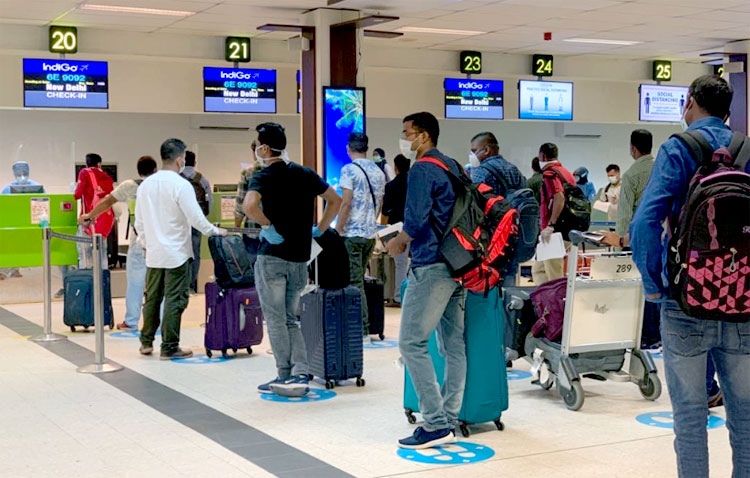
As the domestic travel has started in India from May 25, 2020 and talks are on to open international flights, India’s travel and aviation industry is actively taking measures and coming up with solutions to get back travel confidence and resume the aviation industry.
The aviation and travel industry discussed measures to build confidence in air travel post Covid-19 and highlighted some key initiatives being taken by the industry in India. This was done during a virtual session where the aviation and travel value chain came together under the aegis of the U.S.-India Aviation Cooperation Program (ACP) to discuss ways to restore customer confidence in flying amid health concerns over COVID-19 and to embrace a proactive customer experience in air travel.
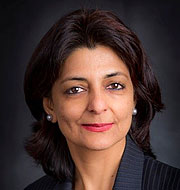
“Pratt & Whitney has been supporting its customers in India to meet the demands of the world’s fastest growing aviation market. In fact, even during the recent pause in air travel due to the extended lockdown, we have continued to work closely with our airline customers – bringing in special charters to upgrade fleets, improving quick-turn MRO capabilities and reducing turn-around times – thereby ensuring that airlines are ready for a well-supported return to demand,” said Ashmita Sethi, President and Country Head, Pratt & Whitney, UTC India
“The COVID-19 pandemic requires a joint effort to minimise air travel health risks, and restore public confidence in travel and aviation. As air travel resumes and restrictions ease, the industry needs to partner and collaborate to develop new solutions, build on the existing best practices, and provide a safe travel experience to travellers. The safety and well-being of travellers, passengers and industry employees is a top priority for ACP and its members,” said Sandeep Bahl, Program Director, US-India Aviation Cooperation Program.
As air travel recovers from the COVID-19 impact, innovation and coordination between the industry and government will be key to restoring passenger confidence, noted Ashmita Sethi, President and Country Head, Pratt & Whitney, UTC India as she emphasised the need for industry alignment. “Pratt & Whitney has been supporting its customers in India to meet the demands of the world’s fastest growing aviation market. In fact, even during the recent pause in air travel due to the extended lockdown, we have continued to work closely with our airline customers – bringing in special charters to upgrade fleets, improving quick-turn MRO capabilities and reducing turn-around times – thereby ensuring that airlines are ready for a well-supported return to demand,” she said during the discussion.
Airlines display updated action
The aviation and hospitality industries also shared initiatives that they are taking to minimise the risk of virus transmission and layers of protection being built into every aspect of travel. This includes contactless boarding experience for passengers, cleaning and disinfecting practices in an aircraft, minimising contaminants from spreading throughout the aircraft cabin through the careful design of the cabin air system and encouraging passengers to wear face coverings.
The aviation and hospitality industries shared initiatives include contactless boarding experience for passengers, cleaning and disinfecting practices in an aircraft, minimising contaminants from spreading throughout the aircraft cabin through the careful design of the cabin air system and encouraging passengers to wear face coverings.
The importance of seamless coordination between airports, airlines and other stakeholders in the travel value chain, as customers navigate the ‘new normal’ of flying was also underlined.
“As the largest airline in India, IndiGo has developed our ‘lean, clean flying machine’ to help customers build confidence that travelling through the airports and on our aircraft will not put them at risk at all,” said William Boulter, Chief Commercial Officer, IndiGo. As the domestic flights resumed in India from May 25, 2020 airlines like IndiGo are taking all necessary measures to ensure as contactless travelling as possible for the passengers.

Airlines like Indigo, AirAsia are providing safety kits to all the passengers. Social media updates from these airlines have also been an encouragement in gaining passenger confidence. With photos, videos and passenger experiences, airlines and airports are constantly showcasing what they are doing and sharing the updates.
We are doing all that we can to enable a happy yet contactless 6E journey! #SocialDistancing #LeanCleanFlyingMachine #letsindigo pic.twitter.com/EwMbDgU1Da
— IndiGo (@IndiGo6E) July 13, 2020
Airline companies have also introduced additional precautionary measures to win the trust of flyers. Airlines like SpiceJet are regularly disinfecting customer touchpoints and surfaces before every flight and some have even made web check-in mandatory to avoid queues at airports. The airline’s crew members and ground services personnel are undergoing detailed health check-ups at regular intervals, as well as wearing protective gear at all times.
Airports assure safety
“The COVID-19 pandemic is an unprecedented crisis for the aviation industry. The recovery from this crisis can happen only by restoring public confidence in the health and safety of flying. The new mitigation measures introduced at airports with respect to sanitisation, cleanliness, hygiene and social distancing, as well as health screening procedures on departure and arrival have significantly reposed confidence amongst the flyers, which is evident from the increasing number of air travellers,” said Videh Kumar Jaipuriar, CEO, Delhi International Airport Limited (DIAL). “At Delhi Airport we have set up UV tunnels to sanitise baggage, baggage trolleys etc., installed highly efficient HEPA filters to trap and flush out harmful particles such as pollen and dust mites, introduced contactless food ordering and delivery system among others, which have been highly appreciated by the people at large and boosted passenger confidence to a large extent.”

“We continue to rigorously follow recommendations and measures by our industry, international council, health and safety organisations and other stakeholders to restore confidence in air travel for our people in India,” said Usha Padhee, Joint Secretary, MoCA, India
Aviation is one of the safest mode of transport, and passenger confidence in air travel needs to be reinforced especially as India has lifted restrictions on domestic air travel and international air travel is expected to resume soon, Pradeep Panicker, CEO, GHIAL (GMR Hyderabad International Airport Limited) pointed out. “We are very optimistic that the industry will bounce back and the new normal is here to stay. The collaborative efforts of all stakeholders of the aviation industry in making the passenger journey safe to overcome the turbulent times is commendable.”
‘Voice of Pax’, a survey conducted by Bangalore International Airport Limited (BIAL) to understand passenger perception and expectation towards air travel amid COVID-19 pandemic, revealed that 90% of passengers considered air travel much safer compared to the other modes. According to the findings, 87% participants also felt airports are safer compared to train and bus stations. Interestingly, this higher safety perception associated with air travel and airports have been improving through the weeks owing to various safety measures implemented at the airport, including contactless processing and heightened hygiene measures.
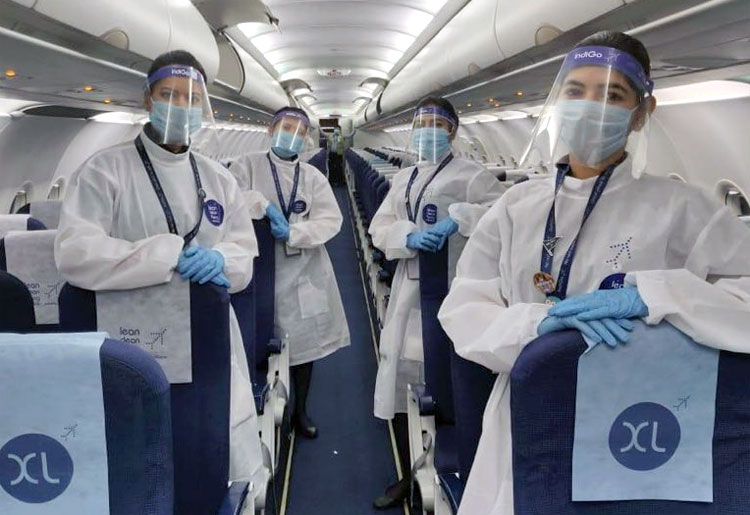
25% of the respondents confirmed their intent to take a flight in the next one month after reopening. Interestingly, another 19% appeared to be undecided about their intent to travel. However, the comfort levels associated with air travel progressively increased to 24%, after the conclusion of the third phase. Work related travel was cited as the most important reason for their travel intent at 60%, while personal was the next at 30%.
“Based on the participants feedback, BIAL has being refining the Standard Operating Procedures to boost confidence of passengers who are uncomfortable about the air travel. There is a high standard of expectation from the passengers in terms of safety, well-being and hygiene to make airports a safe place to travel. Together with Lead Cap, we conducted a survey to understand the customer sentiment and address issues based on their feedback,” said a BIAL spokesperson.
Collaborative and coordinated approach stressed
While deliberating over the concerns, the industry agreed to work together to establish industry-recognised safety recommendations and create awareness on the measures they are taking to reduce the risk of transmission in transit in an aircraft, airports or hotels.
During the session, representatives from the Ministry of Civil Aviation (MoCA), Ministry of Tourism and global aviation bodies like the ICAO and IATA also stressed on the importance of a collaborative and globally co-ordinated approach towards increasing consumer confidence and demand.
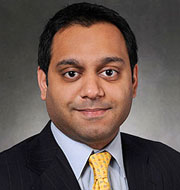
Stressing upon improved air travel health measures being the need of the hour, Salil Gupte, President, Boeing India said, “We are partnering with airlines, MoCA, DGCA and the industry to create a multi-layered approach focused on keeping passengers and airline crews healthy. Layered protection requires a system-wide approach extending beyond the airplane to the full travel experience.”
“We continue to rigorously follow recommendations and measures by our industry, international council, health and safety organisations and other stakeholders to restore confidence in air travel for our people in India,” said Usha Padhee, Joint Secretary, MoCA, India. She further added that the discussion that happened during the session demonstrates that collaborative approach between all stakeholders is the way to restore the confidence to bring air travel back.
Meenakshi Mehta, Joint Director General, Ministry of Tourism, India also affirmed that the focus is to bring back the vibrancy in India’s tourism sector and to collaborate with the travel trade for achieving the same.
The restart of aviation and future resilience can be achieved by building confidence in travelling public by harmonised internationally bench-marked public health measures, and collective efforts by stakeholders, Dr. Shefali Juneja, representative of India to ICAO stated.
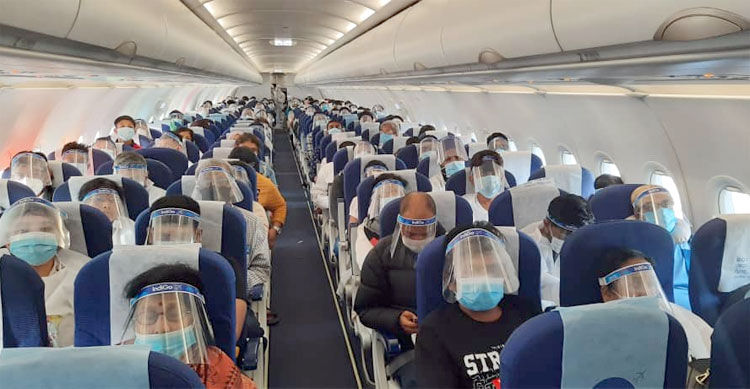
“All of us across the travel and tourism value chain face an uphill challenge if our customers are not travelling. We need to work together to restore the confidence about travelling. It is important for harmonisation of processes among all stake holders, and to recognise aviation’s role in economic growth, job creation, delivery of goods and services, and global connectivity,” said Amitabh Khosla, Country Director – India, IATA.
Boeing’s Confident Travel Initiative
Boeing recently announced its Confident Travel Initiative where it stated that its team of experts will work with airlines, global regulators, industry stakeholders, flying passengers, infectious disease experts and behavioural specialists to establish industry-recognised safety recommendations. “The team is also advising operators on existing, EPA-approved disinfectants that are compatible with airplane flight decks and cabins and testing other sanitizers. Boeing airplanes utilise High Efficiency Particulate Air (HEPA) filters that trap 99.9+ percent of particulates — including bacteria and viruses from recirculated air and prevents them from re-circulating back to the cabin,” the company stated.
"As air travel slowly begins to resume and restrictions ease around the globe, health and safety remain our top priorities for our teams who design, build and service the airplanes and all those who fly on them," said Boeing President and CEO David Calhoun. Boeing is also focusing on longer-lead items that will serve as additional layers of protection to what’s already in place today. This includes existing UV technology and how it might be used to sanitise the flight deck, off the shelf anti-microbial coatings that provide a hostile environment for viruses and bacteria once it’s sprayed on surfaces and self-disinfecting airplane lavatory.
According to the findings, 87% participants also felt airports are safer compared to train and bus stations. Interestingly, this higher safety perception associated with air travel and airports have been improving through the weeks owing to various safety measures implemented at the airport, including contactless processing and heightened hygiene measures.
Stressing upon improved air travel health measures being the need of the hour, Salil Gupte, President, Boeing India said, “We are partnering with airlines, MoCA, DGCA (Directorate General of India) and the industry to create a multi-layered approach focused on keeping passengers and airline crews healthy. Layered protection requires a system-wide approach extending beyond the airplane to the full travel experience. Having consistent, industry-recognised safety standards and protocols will be an important part of recovery as travel resumes.”
Despite the uncertainty and distress brought on by the COVID-19 pandemic, demand for air travel will slowly begin to return and when it does, travellers and flight crews deserve to embark on a journey without hesitation, stated Michael Delaney, Vice President, Digital Transformation at Boeing and leader of Confident Travel Initiative. They need to know that from curbside to airplane and beyond, there is a coordinated system designed to help keep them safe in light of the pandemic.
"Our commitment to ensuring the health of airline passengers and crews is unwavering. We're working with partners to enhance aircraft cleanliness procedures and identify other areas to further reduce the risk of airborne illness transmission," said Delaney.





